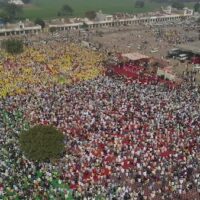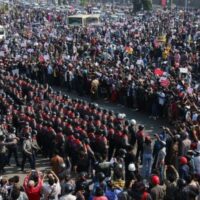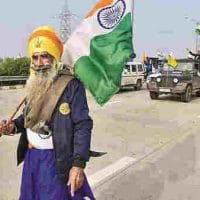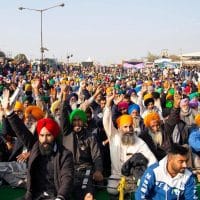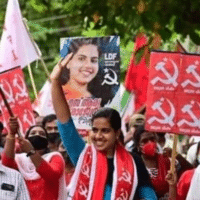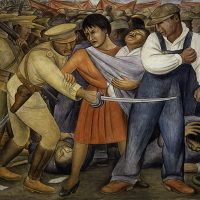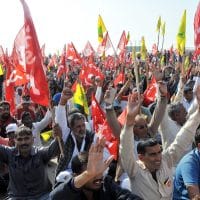-
From the Murder of Berta Cáceres to Dam Disaster in Uttarakhand
March 2, 2021 was the five year anniversary of the murder of Berta Cáceres, who opposed the Agua Zarca dam in Honduras. That date was less than one month after the deaths of dozens of people from Tehri Dam disaster in Uttarakhand, India. The two stories together tell us far more about consequences of the insatiable greed of capitalism for more energy than either narrative does by itself.
-
BJP begins to pay political price as farmers struggle completes three months
IN the week before the historic nationwide farmers’ struggle completed three months on February 26, the BJP has begun to pay a heavy political price for its pro-corporate adamancy.
-
Bhima Koregaon: Varavara Rao gets bail on medical grounds for six months
Just as the Bombay HC pronounced the verdict, the additional solicitor general sought a stay on the order for three weeks. However, the court rejected it.
-
India’s forever wars and forever warriors
Looking ahead, pre-conditions now exist for a positive turn to the India-China bilateral relationship.
-
Social movements and organizations condemn arrest of 21-year-old Indian climate activist
21-year-old Disha Ravi was arrested on charges of sedition and criminal conspiracy for her involvement with a ‘toolkit’ which contained campaign material in support of the the ongoing farmers’ agitation in the country. Two other activists also face arrest.
-
Leading from the front: The role of women in Farmers’ movement
As lakhs of farmers continue their protest against the new farm legislations introduced by the Modi government, a remarkable number of women are not only braving the rough weather by participating in these demonstrations but are also leading from the front.
-
U.S. reboots Quad in unseemly hurry
The Japanese news agency Kyodo reported from Washington Sunday quoting “a source” that the Biden Administration had proposed to New Delhi, Tokyo and Canberra the idea of holding an online summit meeting of the leaders of the “Quad”.
-
Modi government attacks the media
The Editors Guild of India, The Press Club of India and The Communist Party of India (Marxist) condemned the action against the news portal.
-
The Indian farmers are right: their land is at stake (Part 2)
In the previous part of this article we saw that the Indian rulers are actively preparing the legal groundwork for parting peasants from their land. In the following part we place this in an international context.
-
The Indian farmers are right: their land is at stake (Part 1)
The protesting kisans on the borders of Delhi repeat one thing over and over: When fighting against the three farm-related Acts, they are fighting to save their land.
-
Covid-19, climate change and the road not to be taken
Governments from diverse political dispositions have responded to the pandemic by arming themselves with unprecedented emergency powers. India offers a stunning example of how the pandemic can be recast as a security concern.
-
India needs course correction on Myanmar
The ASEAN Chair’s statement of Feb, 1 recalled the “purposes and the principles enshrined in the ASEAN Charter” which include respecting the principles of sovereignty, equality, territorial integrity, non-interference, consensus and unity in diversity.”
-
Kerala communists serve the people, look to youth and women
At 21 years of age, Arya Rajendran is barely eligible to vote. Nevertheless, she is now the mayor of Kerala’s capital city Thiruvananthapuram, population 2,585,000. She is a second-year student at All Saints College. She concentrates in math.
-
My wish is that you win this fight for truth
On 26 January, India’s Republic Day, thousands of farmers and agricultural workers will drive their tractors and walk into the heart of the capital, New Delhi, to bring their fight to the doors of the government.
-
The patriots
Protesting farmers are reclaiming the idea of the nation.
-
Farmers in protest: Learning from the past and creating history with a real definition of nationalism
“The nationalists to be effective must harness the nation into action, into revolt.… The nation will stir itself to action only on assurance of nationalization. i.e.… Freedom from slavery of Imperialist—capitalists.” —Bhagat Singh
-
Global vaccine apartheid
A vaccine alone will not be enough to end the pandemic as it must also be made available at an affordable price and allocated in a way that achieves equity. It follows that suspending intellectual property rights related to COVID-19 is the most appropriate solution to our current situation of global vaccine apartheid.
-
Why are people going hungry in India despite a massive grain surplus?
The peasants gathered on the Delhi border understand all these issues much more clearly than either Modi or the intelligentsia advocating a shift away from food grains. Ironically, it is the latter group who are suggesting that the peasants are ignoramuses!
-
The true significance of the historic farmers struggle
First, it is led by over 500 farmers’ organisations in the country, who have united under the platform of Samyukta Kisan Morcha(SKM). All sections of the peasantry have joined together.
-
21-year-old college student elected Mayor of Kerala Capital
Ms Rajendran had won from the Mudavanmughal ward of the city corporation, bagging 2,872 votes, 549 more than the rival Congress candidate.


